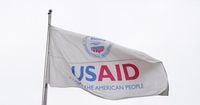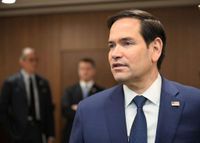SIOUX FALLS, S.D. (Dakota News Now) - Recent cuts to the United States Agency for International Development (USAID) have raised concerns among those in the Midwest, particularly regarding the impact on foreign assistance programs.
The USAID is tasked with providing essential assistance to countries, with the goal of establishing stability and preventing issues like disease outbreaks that could affect the U.S. The agency employs or contracts nearly 110,000 individuals, whose livelihoods are now at stake after significant funding cuts orchestrated during the Trump administration.
“They’re called missions in over 100 countries, primarily in Africa, Asia, Latin America, the Middle East, and Eastern Europe,” said DeAndra Beck of Michigan State University, illustrating the breadth of the agency's reach. The intention is clear: enable these regions to achieve self-sufficiency, where children get vaccinated, farmers enhance crop yields, and communities can rise above poverty.
However, the recent budget cuts threaten these aims. According to Matt Winters, a USAID consultant from the University of Illinois, “The pipeline to go to the U.S. agricultural community is cut”, which translates to a staggering loss of purchasing power for U.S. farmers, estimably a half-billion dollars.
As access to information dwindles—websites for USAID and some contractors have gone offline—concerns deepen. “People are, I think, under orders not to talk to the media, and so it’s a challenging situation to find those sources,” commented Winters.
One Midwest contractor, who wishes to remain anonymous due to fears of retaliation, explained that his work encompassed regions including Central and South America, the Middle East, and North Africa. He emphasized the crucial role of USAID in preventing diseases from escalating across borders, stating, “It’s super important to prevent a worldwide epidemic, right, or pandemic.”
Supporters of the funding cuts argue that they are necessary for the financial well-being of the U.S., while detractors contend that the educational programs previously funded were beneficial to individuals in host nations, albeit with minimal direct impacts on those countries themselves.
On the global stage, similar concerns are echoed. In a recent report from the United Nations AIDS agency (UNAIDS), it was warned that without restored funding, up to 2,000 new HIV infections a day could arise. UNAIDS executive director Winnie Byanyima depicted the dire consequences from disrupted funding, which has led to shuttered clinics and the layoff of thousands of health workers.
“This sudden withdrawal of U.S. funding has been shutting down many clinics, laying off thousands of health workers,” Byanyima said during a press conference on March 24, 2025. The humanitarian implications are staggering: Without the funding, there could be an additional 6.3 million AIDS-related deaths over the next four years — a ten-fold increase compared to current levels.
President Trump’s administration originally paused nearly all foreign aid, aligning the cuts with his distinct “America First” policy. Though some officials, including U.S. Secretary of State Marco Rubio, have attempted to downplay the cuts by claiming lifesaving services are still being funded, critics argue that the blanket freeze has devastating individual and community-level repercussions.
The Catholic Relief Services (CRS) has vocally condemned the cuts, emphasizing their impact. On March 10, Rubio reported a staggering 83% of USAID programs were terminated under the pretense that previous contracts did not serve U.S. national interests. CRS countered on March 17, declaring that these cuts will “permanently cut off critical aid to more than 20 million people worldwide.”
Sister Florence Muia, who operates a facility in Kenya for people living with HIV, noted that an alarming 1.4 million individuals in her country depend on access to treatments that are now in jeopardy. She indicated it compromises not just treatment but the foundational health services communities rely upon.
On the U.S. front, communities are also feeling the unease. Washington’s new archbishop, Cardinal Robert Walter McElroy, has called attention to the administration's policies. He reflects on the cultural fabric of the nation, stating it fails to recognize the humanity of undocumented individuals, saying, “We as Christians have to stand up and say, ‘these are our neighbours; these are men and women and children whom we know, and they live good lives.’”
As the landscape of foreign aid becomes increasingly bleak, both stateside and abroad, the enduring question lingers: How will these cuts shape the future of international cooperation and humanitarian assistance? Observers worry that the effects of these policy moves might unravel decades of work aimed at assisting the world's most vulnerable populations. While opinions differ over the merits of the cuts, one undeniable truth emerges: the consequences of underfunding vital programs could lead to more pain, suffering, and preventable deaths.
Despite the challenges, advocates strive for a return to comprehensive aid, urging the necessity of restoring support for missions that save lives and promote stability—not only for countries far away but for the broader interests of the United States.



